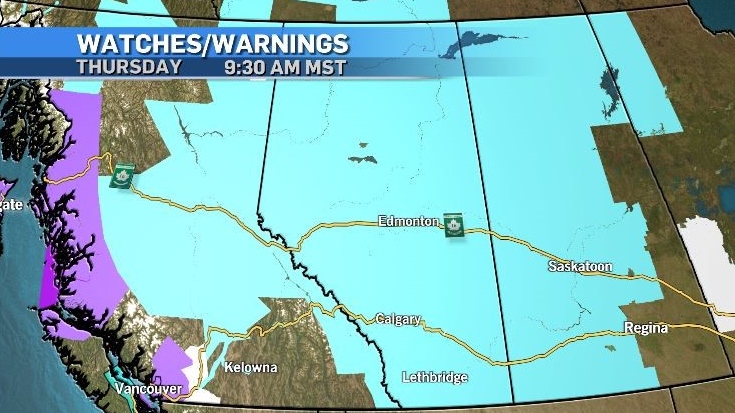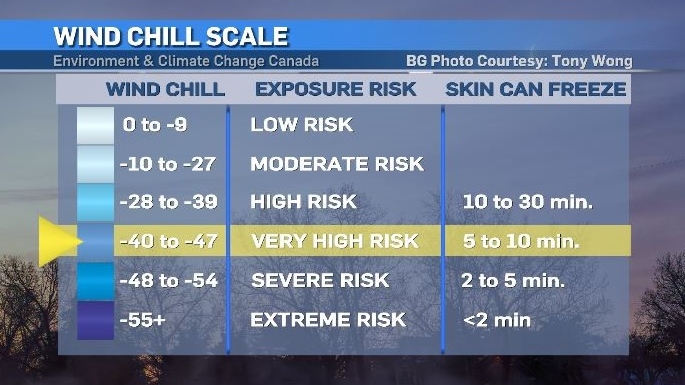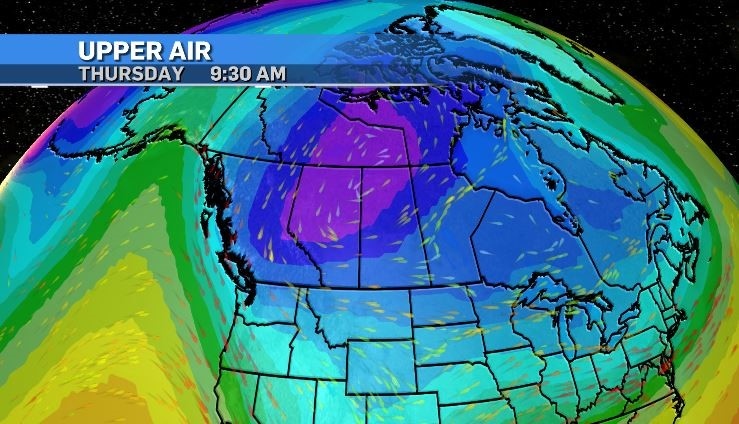Calgary wakes up to wind chill values of -44, and it is only getting colder
As expected the entire province of Alberta was placed under an extreme cold warning Thursday as temperatures hit -28 C with wind chill values making it feel like -44.
Environment and Climate Change Canada noted, “Air temperatures will continue to gradually fall through the end of the week with the coldest values expected by Saturday morning.”
At times, wind chill values in the province will sit at -50. A wind chill value between -48 and -54 poses a “severe risk” for hypothermia and/or frostbite, and exposed skin can freeze in just two to five minutes.
 Weather warnings issued by Environment and Climate Change Canada as of 8 a.m. Thursday, Jan. 11, 2024. Extreme cold warnings (teal), snowfall warnings (white), and wind warnings (light purple).
Weather warnings issued by Environment and Climate Change Canada as of 8 a.m. Thursday, Jan. 11, 2024. Extreme cold warnings (teal), snowfall warnings (white), and wind warnings (light purple).
Calgary started Thursday under a “very high risk” related to wind chill - meaning exposure to the elements should be limited, as unprotected skin can freeze in five to 10 min.
By Friday morning, wind chill values in southern Alberta will elevate that risk even further, as wind chill values could reach -48 for the city.
Those coldest temperatures and wind chill values over the weekend coincide with the polar vortex elongating through Alberta and dipping close to the U.S. border.
Clear skies will amplify this effect as cloud cover can serve as an insulating layer trapping outgoing longwave radiation (heat) closer to the surface.

Extended cold spells of this magnitude are rare in Alberta. According to the public records from ECCC, the last time Calgary remained below -30 C for an entire day was nearly 20 years ago, on Jan. 27, 2004.
Records are likely to be broken with this cold weather, but not necessarily in Calgary. The overnight temperatures this weekend are expected to remain above -40 C, and the record low both Jan. 12 and 13 is -42.2 C.

A warm up is expected by Monday, however there is low confidence in a full recover, at least initially. Calgary is unlikely to achieve a seasonal daytime high over the next seven days and will only crest the average overnight low for two days.

CTVNews.ca Top Stories

Richard Perry, record producer behind 'You're So Vain' and other hits, dies at 82
Richard Perry, a hitmaking record producer with a flair for both standards and contemporary sounds whose many successes included Carly Simon’s 'You’re So Vain,' Rod Stewart’s 'The Great American Songbook' series and a Ringo Starr album featuring all four Beatles, died Tuesday. He was 82.
Hong Kong police issue arrest warrants and bounties for six activists including two Canadians
Hong Kong police on Tuesday announced a fresh round of arrest warrants for six activists based overseas, with bounties set at $1 million Hong Kong dollars for information leading to their arrests.
Read Trudeau's Christmas message
Prime Minister Justin Trudeau issued his Christmas message on Tuesday. Here is his message in full.
Stunning photos show lava erupting from Hawaii's Kilauea volcano
One of the world's most active volcanoes spewed lava into the air for a second straight day on Tuesday.
Indigenous family faced discrimination in North Bay, Ont., when they were kicked off transit bus
Ontario's Human Rights Tribunal has awarded members of an Indigenous family in North Bay $15,000 each after it ruled they were victims of discrimination.
What is flagpoling? A new ban on the practice is starting to take effect
Immigration measures announced as part of Canada's border response to president-elect Donald Trump's 25 per cent tariff threat are starting to be implemented, beginning with a ban on what's known as 'flagpoling.'
Dismiss Trump taunts, expert says after 'churlish' social media posts about Canada
U.S. president-elect Donald Trump and those in his corner continue to send out strong messages about Canada.
Heavy travel day starts with brief grounding of all American Airlines flights
American Airlines briefly grounded flights nationwide Tuesday because of a technical problem just as the Christmas travel season kicked into overdrive and winter weather threatened more potential problems for those planning to fly or drive.
King Charles III is set to focus on healthcare workers in his traditional Christmas message
King Charles III is expected to use his annual Christmas message to highlight health workers, at the end of a year in which both he and the Princess of Wales were diagnosed with cancer.

































